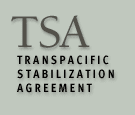It’s not a surprise that the industry has lost count of the number of increases carriers have tried with mixed success to pass along this year. Why not end the year on a revenue generating note? After Maersk announced that they were idling capacity to the tune of around 94,000 TEU, carriers announced increases of $400 to the West Coast and $600 to inland destinations with effect from December 1st. This in spite of the fact that financially, they appear on the road to recovery. The pattern of behavior they’ve engaged in this year, including announcing an early start to getting 2013-2014 contract rate increases, is a reason why this industry should not continue to have antitrust immunity. 
The origins of antitrust immunity date back to when there was a robust American-flagged maritime industry of companies like Sealand, CSX, and APL. Over time, these companies have been sold off, wholly or in part, to foreign private and public entities. As a result, the very reasons for the protection of the industry were rendered irrelevant.
We asked transportation attorney Ed Greenberg of GKG Law and the Transportation Counsel for the NCBFAA for his perspective on the history of carrier antitrust immunity. Ed has worked with Camelot before and is our counsel for these matters and an opinion we deeply respect:
Before Congress enacted this legislation granting immunity as part of the Shipping Act, 1916, it relied on an investigation into the shipping industry referred to as the Alexander Report. That report concluded, undoubtedly because the US was then primarily interested in its shipper/exporters, that antitrust immunity would prevent rate wars, fighting ships and generally provide for rate stability – – which was deemed to be desirable. On the other hand, the British – – which enacted matching immunity for the carriers and had little shipper interests at heart but which had much interest in protecting the British merchant marine – – supported this initiative because it protected the carriers. In other words, the British felt that rate stability would enhance carrier profitability. Now, of course, there is very little in the way of American flag fleet, nor are US exporters particularly benefited by the fact that the foreign flag lines are able to collectively discuss rates and rationalize service.
So, to the extent that American interests were ever really protected – – and I question the conclusions that were drawn from the Alexander Report – – it seems clear that the underlying rationale for that immunity no longer exists. Shipping is controlled by foreign interests and most of the world’s exports come from Asia. Precisely how US interests benefit from the continued application of antitrust immunity for steamship lines escapes me, which is exactly the conclusion that was drawn by Antitrust Modernization Commission in its report that was issued in April 2007. Regrettably, although that Commission concluded that the shipping industry would operate more efficiently without such immunity and recommended that carrier immunity be eliminated, Congress has not acted.
